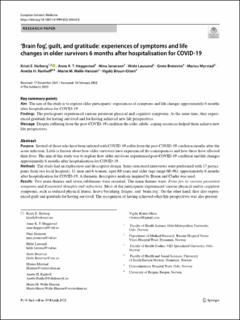| dc.contributor.author | Heiberg, Kristi Elisabeth | |
| dc.contributor.author | Heggestad, Anne Kari Tolo | |
| dc.contributor.author | Jøranson, Nina | |
| dc.contributor.author | Lausund, Hilde | |
| dc.contributor.author | Breievne, Grete | |
| dc.contributor.author | Myrstad, Marius | |
| dc.contributor.author | Ranhoff, Anette Hylen | |
| dc.contributor.author | Walle-Hansen, Marte | |
| dc.contributor.author | Bruun-Olsen, Vigdis | |
| dc.date.accessioned | 2022-06-13T11:49:40Z | |
| dc.date.available | 2022-06-13T11:49:40Z | |
| dc.date.created | 2022-04-22T11:03:09Z | |
| dc.date.issued | 2022 | |
| dc.identifier.citation | Heiberg, K. E., Heggestad, A. K. T., Jøranson, N., Lausund, H., Breievne, G., Myrstad, M., Ranhoff, A. H., Walle-Hansen, M. M. & Bruun-Olsen, V. (2022). ‘Brain fog’, guilt, and gratitude: experiences of symptoms and life changes in older survivors 6 months after hospitalisation for COVID-19. European Geriatric Medicine, 13(3), 695-703. | en_US |
| dc.identifier.issn | 1878-7649 | |
| dc.identifier.uri | https://hdl.handle.net/11250/2998515 | |
| dc.description.abstract | Purpose: Several of those who have been infected with COVID-19 suffer from the post-COVID-19 condition months after the acute infection. Little is known about how older survivors have experienced the consequences and how these have affected their lives. The aim of this study was to explore how older survivors experienced post-COVID-19 condition and life changes approximately 6 months after hospitalisation for COVID-19.
Methods: The study had an explorative and descriptive design. Semi-structured interviews were performed with 17 participants from two local hospitals, 11 men and 6 women, aged 60 years and older (age range 60–96), approximately 6 months after hospitalisation for COVID-19. A thematic descriptive analysis inspired by Braun and Clarke was used.
Results: Two main themes and seven subthemes were revealed. The main themes were: From few to various persistent symptoms and Existential thoughts and reflections. Most of the participants experienced various physical and/or cognitive symptoms, such as reduced physical fitness, heavy breathing, fatigue, and ‘brain fog’. On the other hand, they also experienced guilt and gratitude for having survived. The recognition of having achieved other life perspectives was also present.
Conclusion: Six months after undergone COVID-19 the participants still experienced various distressing symptoms, which were in line with larger studies. The novel findings of this study were connected to the existential area, where the patients’ thoughts and reflections of guilt, gratitude, and new life perspectives were revealed. These findings are important for health professionals to consider when treating patients after COVID-19. | en_US |
| dc.language.iso | eng | en_US |
| dc.rights | Navngivelse 4.0 Internasjonal | * |
| dc.rights.uri | http://creativecommons.org/licenses/by/4.0/deed.no | * |
| dc.title | ‘Brain fog’, guilt, and gratitude: experiences of symptoms and life changes in older survivors 6 months after hospitalisation for COVID-19 | en_US |
| dc.type | Journal article | en_US |
| dc.type | Peer reviewed | en_US |
| dc.description.version | publishedVersion | en_US |
| dc.rights.holder | © The Author(s) 2022. | en_US |
| dc.source.pagenumber | 695-703 | en_US |
| dc.source.volume | 13 | en_US |
| dc.source.journal | European Geriatric Medicine | en_US |
| dc.source.issue | 3 | en_US |
| dc.identifier.doi | https://doi.org/10.1007/s41999-022-00630-8 | |
| dc.identifier.cristin | 2018362 | |
| cristin.ispublished | true | |
| cristin.fulltext | original | |
| cristin.qualitycode | 1 | |

